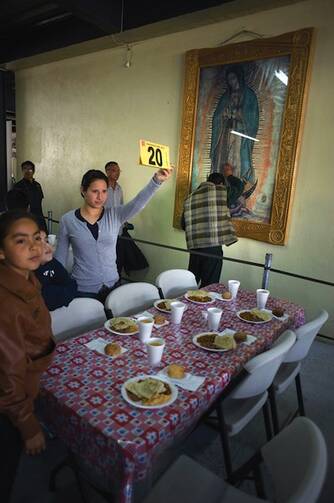Even as the Obama administration presses for comprehensive immigration reform, more than a million immigrants have been deported from the United States over the past five years. That wave of deportees has overwhelmed Mexican border cities and strained migrant shelters used to serving people headed north, not south.
Alberto Xicotencatl directs a Catholic-run migrant shelter in Saltillo, a city in the northeastern Mexican state of Coahuila not far from the Texas border. He said deportees are easy targets for organized crime gangs, and many deportees linger in border towns in desperate attempts to return to the United States. “There are people that have all of their family in the United States and no longer feel Mexican,” Xicotencatl explained.
The United States “repatriated” more than 369,000 Mexican nationals in 2012 and 87,100 so far in 2013, according to Mexico’s Interior Ministry. The statement said the Mexican and U.S. governments are considering “reactivating” a program for repatriating Mexicans through flights to Mexico City, avoiding problematic border areas and “guaranteeing respect for rights and human dignity.”
Sister Leticia Gutierrez, director of the Scalabrini Mission for Refugees as Migrants, said deportations separate families. Often one member is sent south, while children and other relatives remain in the United States. She also said sometimes family members are separated and repatriated through multiple ports of entry.
A report prepared for the Jesuit-run Kino Border Initiative in Nogales, Ariz., and Nogales, Mexico, with funding from the U.S. bishops’ Catholic Relief Services, found family breakups during deportation were common, despite the stated objectives of the Department of Homeland Security to avoid such outcomes.
And “there’s not an investigation into the conditions of the community that is receiving deportees,” Sister Gutierrez complained. The nearly 2,000-mile frontier is somewhat placid in places like Tijuana but rife with violence and organized crime and drug cartel activities farther east in Tamaulipas. Cartels sometimes try to recruit recent deportees, she said. At other times, they simply rob deportees of what little they have or try to extort money from their relatives still in the United States.
The impact of deportations is often felt far from the border, especially as waves of Mexicans arrive back in their communities of origin and are often unable to earn more than a fraction of what they made in the United States. Many also arrive with U.S.-citizen children, who are often more accustomed to interacting and learning in English and sometimes lack the proper documents to enroll in Mexican public schools.
Many potential migrants are now staying put in Mexico because of difficulties crossing the border, others because of poor economic prospects in the United States—a phenomenon reflected in data released last year by the Pew Hispanic Center showing that the number of Mexicans returning (voluntarily or otherwise) outnumbered those leaving. The story is somewhat different in some Central American countries, where migrants often flee poverty and violence.








